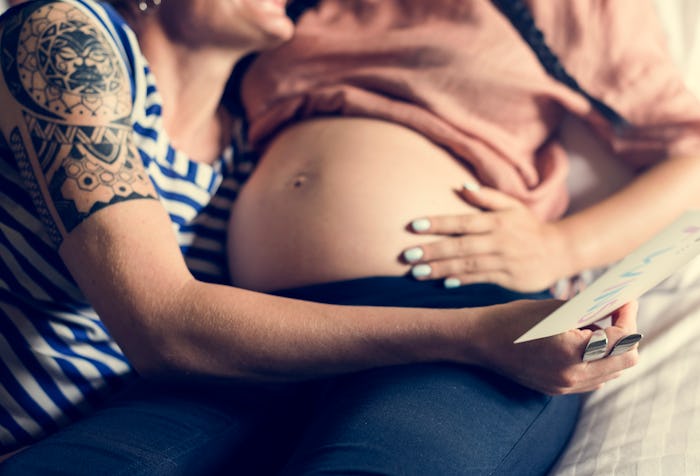Life

9 Things Non-Binary Parents Deserve
As a proudly self-proclaimed they-at-home-mom — a non-binary parent whose pronouns are she/they — my experiences from pregnancy to today have been an interesting, sometimes frustrating, journey. Every parenting book I’ve read, class I’ve attended, and doctors office I’ve visited associates parenting and pregnancy with “women who were made for this,” and traditional narratives of pregnancy, postpartum, and beyond tend to do the same outside of those spaces. From mommy-and-me classes to maternity clothes, health services for pregnant women to birthing guides with exclusive language, the world of parenthood and expecting parents remains heavily influenced by the gender binary.
But people of all gender identities, and even people who don’t identity with a gender at all, are capable of be becoming parents. The problem, of course, is that most parenting spaces do not respect this reality. So, for non-binary parents navigating pregnancy, birth, and life with children, it can be difficult to find spaces where you belong and support networks that are gender-affirming.
Please, take a moment to remember that non-binary parents exist. Some non-binary parents even use traditional words like “mom” and “dad” or “she” and “him” to describe themselves, and some don’t. Either way, our identities aren’t something to be figured out or debated. Our identities are something to be recognized, humanized, and taken seriously. And while we are not a monolithic group and do not all need the same things, I think a great way to start supporting non-binary parents is to make sure we're getting the following things:
Pronoun Respect
One easy way to do this is by starting off all introductions by asking someone name and pronouns. Then, practice those pronouns and use them regularly. If you make a mistake, correct yourself and say, “I’ll do better.” If someone openly shares their pronouns without asking, thank them for their emotional labor and actively work to remember them. You can even go on social media and ask your friends in your parenting groups to update you with their pronouns if they feel comfortable sharing.
Inclusive Parenting Support Groups
Perinatal mood and anxiety disorders (PMADs) are known to impact dads as well as moms, so parenting support groups should be welcoming to more than just moms from jump. But non-binary parents deserve to have access to support groups that give them the space to discuss and work through their unique (as well as common) struggles, too.
There should be more parenting support groups where non-binary parents can feel safe and understood.
Diverse Parenting & Children's Books
Books for families and children that celebrate the beauty of diversity are important for representation. (Plus, they’re a great way to make a reading session educational.) More books should include non-binary parents who redefine what it means to be a parent, especially with respect to gender.
This goes for books that help parents prepare for pregnancy and birth, too! Inclusive language does wonders!
More Variety In Maternity Clothes
Not all pregnant people are women. I repeat: not all pregnant people are women. People who aren’t women deserve to have pregnancy apparently that fits. And is it too much to ask for gender-neutral pregnancy apparel that’s stylish? Maternity dresses and jumpers are cool, yes, but non-binary parents are ready for some variety in pregnancy apparel that comes in different styles and fits different bodies.
Inclusive Parent-And-Me Classes
Mommy-and-me classes are great and offer moms and babies a chance to socialize, bond, and meet other families. But it can be tough to find spaces like offer the same when you're a non-binary parent.
It’d be awesome for more classes like this to be inclusive and welcoming to non-binary parents. We want other parent friends, too! We want our kids in fun classes, too! But when we’re afraid of being discriminated against, we avoid those spaces.
Culturally-Competent Health Care Providers
When non-binary parents visit their OB-GYN or tour birthing centers and other spaces, they deserve to be treated with respect and care. Even if you don’t take a training course or attend a workshop specifically designed to make sure your health care facility is inclusive and safe to non-binary parents, you can still start by asking for pronouns, using gender-inclusive language during appointments, and unlearning the ways you perpetuate heteronormativity in your workspace.
Discreet Nursing Clothes
Nursing in public can be stressful. The stares, the judgment, you name it! It can be even more stressful for trans nursing parents or nursing parents who are non-binary.
I tend to dress feminine and people assume I identify as a woman, so when I get the stares and judgment it’s usually just because I’m nursing in public and not because of my gender expression or how I present myself. And that’s a privilege. Some non-binary parents are discriminated against for how they look and if they had discreet nursing clothes, it could make nursing even a bit less stressful.
Media Representation
I can’t wait for the day when I see non-binary parents on television and in films. I cannot wait for the day when these representations are just as common as the representations of heteronormative families. Some parents who don’t use traditional pronouns and opt for other variations would be great, too! We exist, we have stories to share, and those stories are just as compelling as anyone else's.
(And it’d be wonderful to see those stories shared by us on screen.)
Gender-Affirming Doulas
Luckily, there are non-binary doulas out there in the world. Like me! And you better believe we are making a difference, because many doula training organizations lack diversity and inclusivity workshops. As a result, many doulas aren’t educated on how to make sure they don’t offend non-traditional birthing families.
If you’re a doula, consider learning more about how you can provide gender-affirming care to non-binary parents who are pregnant and birthing.
This article was originally published on